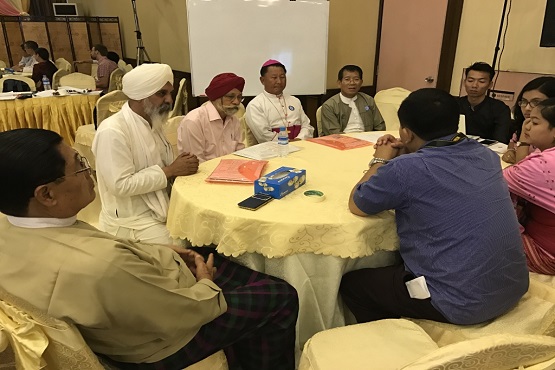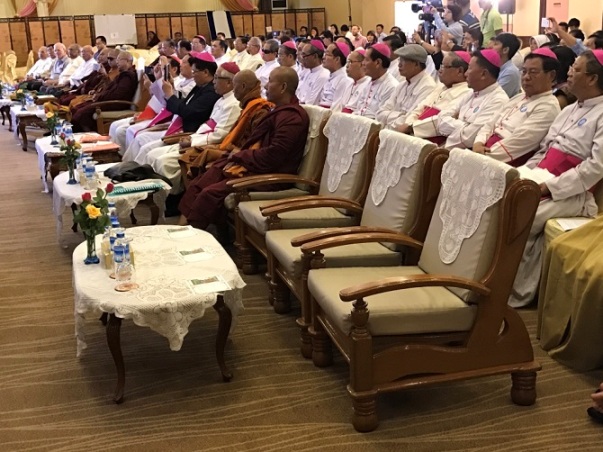Cardinal Bo brings religions together for peace in Myanmar
First interreligious peace conference took place in Yangon and emphasized grassroots change
Cardinal Charles Bo of Yangon took the lead bringing religious leaders together to discuss nation-building and how to end decades of hostilities at the first interfaith peace conference held in Yangon
The April 26-27 event brought together some 200 Buddhist, Christian, Muslim, Hindu leaders, political parties, diplomats and local civil society groups. Religious leaders wanted to seize the momentum as Myanmar transitions to becoming a full democracy after more than 50 years of military rule.

Religious leaders in small groups discuss on how they could play a greater role in promoting peace in the country at an interfaith peace conference in Yangon on April 27. (ucanews.com photo)
Cardinal Bo said that the conference aimed to engage leaders in a dialogue for peace and explore how religions can help promote harmony.
Cardinal Charles Bo of Yangon took the lead bringing religious leaders together to discuss nation-building and how to end decades of hostilities at the first interfaith peace conference held in Yangon
The April 26-27 event brought together some 200 Buddhist, Christian, Muslim, Hindu leaders, political parties, diplomats and local civil society groups. Religious leaders wanted to seize the momentum as Myanmar transitions to becoming a full democracy after more than 50 years of military rule.
Cardinal Bo said that the conference aimed to engage leaders in a dialogue for peace and explore how religions can help promote harmony.
"It is a historic event for the country's peace; taking a first step on a long journey towards peace," Cardinal Bo said in his closing remarks at the conference on April 27.
Over the two days, attendees were involved in group discussions on how engaging people in grassroots programs, interreligious peace initiatives and participation in future peace programs at a national level.
The conference steering committee gathered some 200 discussion points and will hold future meetings to draw up an action plan and to send suggestions on to the government.
Aung Ko, union minister for religious affairs and culture, and Tin Oo, patron of the ruling National League for Democracy (NLD) party, gave opening speeches.
Father Joseph Mg Win from Yangon Archdiocese, a steering committee member, said the interreligious effort was ongoing and they were planning to hold more conferences with influential religious leaders.
"Our religious leaders will join hand in hand and continue our journey towards peace," Father Mg Win, director of Caritas Yangon, told ucanews.com.
Tin Oo, from the NLD, said in a closing speech on April 27 that he was very satisfied with the participation and effort of the religious leaders. He added that religions in Myanmar have peacefully coexisted for centuries but challenges lay ahead. "We can overcome these challenges with the people's desire for peace," he said.
"Feedback and suggestions from religious leaders will really help the government who is currently grappling with the peace process," Tin Oo said.

Catholic bishops from 16 dioceses in Myanmar along with other faith leaders at the Interfaith peace conference in Yangon on April 27. (ucanews.com photo)
Peace is a priority for Aung Sang Suu Kyi who initiated the Panglong Peace Conference in August 2016 aimed at ending decades of internal conflict. However, renewed fighting in Kachin and northern Shan states has been hampering her efforts ahead of the second Panglong conference scheduled for May 24.
The Nobel Laureate has pledged to end hostilities in the country that has been bedeviled with conflict for nearly 70 years.
Grassroots participation
At the conference, religious leaders affirmed the crucial role of grassroots-level participation. Myint Swe, a Buddhist leader and chairman of Yadana Metta Foundation said religious leaders need to push for peace via participation from all people.
"As the country has suffered more than 70 years of civil war, it is right time to push to end the conflict with public support under Aung San Suu Kyi's government," Myint Swe, another steering committee member, told ucanews.com.
He pointed out that it is the duty of religious leaders and civil society groups to advocate for peace at the grassroots level.
"We need to explain to people why conflict has erupted in the country and the importance of peace as people in conflict areas flee due to fighting so it impacts on people's daily survival," said Myint Swe.
Aung Naing, a Hindu leader from Yangon, said religious leaders need to go to the communities and raise awareness about how peace could help their daily survival.
"It would be better if religious leaders created jobs opportunities among the people so they may have close relationships regardless of race and religion," Aung Naing told ucanews.com.
He added that if people from different races and religions worked together for their mutually benefit it would help create a peaceful coexistence.
John Zaw
Myanmar
Source: ucanews.com

